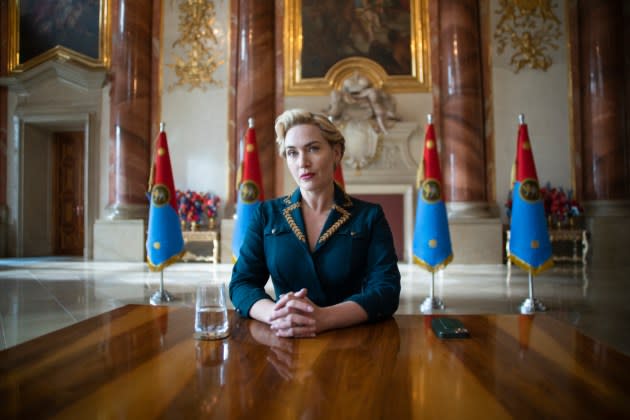How ‘The Regime’ Score Reflected Kate Winslet’s Comedic and Chaotic Dictatorship

“The Regime” showrunner Stephen Frears is a man of few words when it comes to music — at least according to award-winning composer Alexandre Desplat. But that wasn’t a bad thing. The two had previously collaborated, and Desplat liked that approach, as it gave him free reign to come up with compositions that he could bring back to the director.
Recruited for HBO’s “The Regime,” starring Kate Winslet as the chancellor who reigns over an unnamed Central European country, Desplat looked to Winslet’s acting, design and costumes for inspiration. “The music needed to be charged with humor, but not too much,” he says. “There also needed to be an ominous presence. There’s something uncomfortable about these people. They’re almost sad, and they’re crazy and unique, so the music had to show that desperate world.”
More from Variety
Marvel Composers on Crafting Music For Mutants, Gods and Heroes
How 'Shogun,' 'The Crown' and More Dramas Pulled Off Historically Accurate Sounds
He found himself writing music that was layered with “Mitteleuropa sounds. The music is never really happy. It’s a strange mix of melancholy and joy in the music you hear,” Desplat explains.
The world of the show, with huge palaces and a country ready to go to war, dictated that the need for a good-sized orchestra to provide the score’s foundation. In addition, Desplat recruited musicians playing the balalaika (a Russian stringed musical instrument) to create a mix of sounds. He added the cimbalom, which, combined with the orchestrations, infused an energy into the score.
When Frears first heard a cue from Desplat, the showrunner suggested it feature on the main title theme. “It begins every episode and has the scale of a big film,” says Frears. “When we were in Vienna filming, they gave us five palaces, so in my head I had always conceived this as an enormous film, and a piano wasn’t going to work. It needed scale and substance.”
As Desplat watched Winslet, he thought about her theme. Here was a character he saw as someone who dressed in ridiculous colors and loved herself. “There was something pompous about her, and my challenge was translating that to music.
Music is not funny, and you can’t translate humor in music, so it needed to be about the tempo, the stops and starts, and the arrangement of the instruments,” Desplat explains. “Her theme was not meant to be funny. It was unsettling.”
For the final three episodes, Desplat handed the scoring baton to composer Alex Heffes. To honor that “musical hand-shake,” Heffes used some of Desplat’s music in the opening of Episode 4. But as the show goes down a dark direction, so does the music, with Heffes guiding the journey. “I did recap Alexandre’s main theme at the end to join it up with the new material I had written so it felt like a bow had been put on the whole piece.”
Helping Heffes inject a new sound into the score is the arrival of Hugh Grant’s former-chancellor-turned-prisoner, Ed Keplinger. “With his character, you don’t know who he is.Is he good?Isheuptono good? Can you trust him? So, it was interesting to have his music be like shifting quicksand,” Heffes explains.
Ed’s theme allowed Heffes to expand the instrumental palette, and he brought in a choir. But rather than have something melodic and harmonious, Heffes gave the sound a guttural percussive quality accompanying the grunts, groans and stamping of the choir.
“I added in odd combinations of a didgeridoo, a ukulele and a marching band to trip the listener,” says Heffes. “They think they know where this show is going, but they don’t.”
With the tone of the show being darkly funny and filled with Frears’ dark humor, Heffes made sure to chart out how the music would play in the final two episodes. “I marked the peaks and troughs, so where the show is relentless, the music doesn’t become that, too,” says Heffes.
Best of Variety
Emmy Predictions: Documentary and Reality Categories Heat Up With Two Weeks Left Until Voting Begins
Emmy Predictions: Lead Actor (Limited/TV Movie) - Andrew Scott Could be the One to Beat for 'Ripley'
Sign up for Variety’s Newsletter. For the latest news, follow us on Facebook, Twitter, and Instagram.

 Yahoo News
Yahoo News 